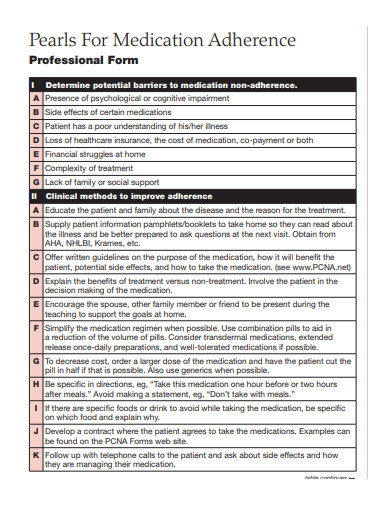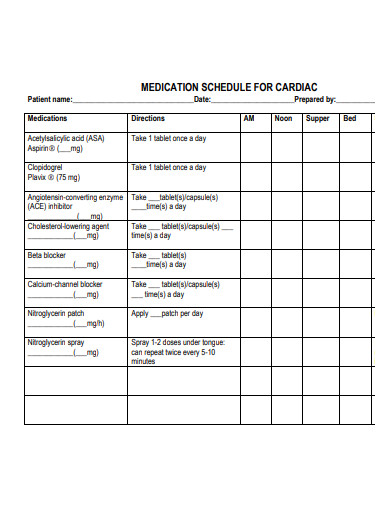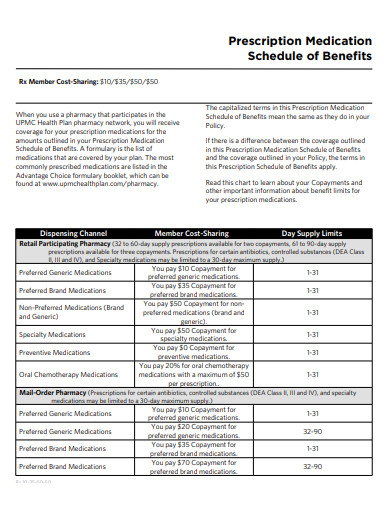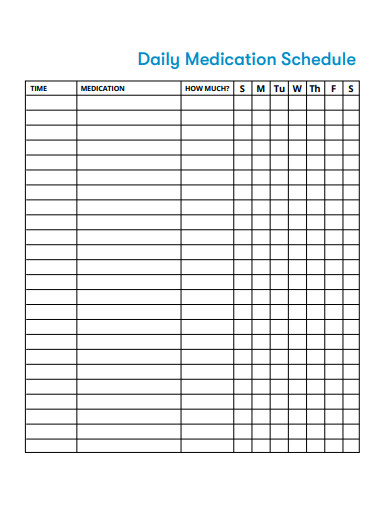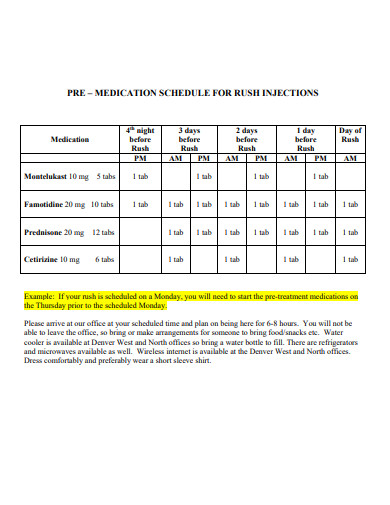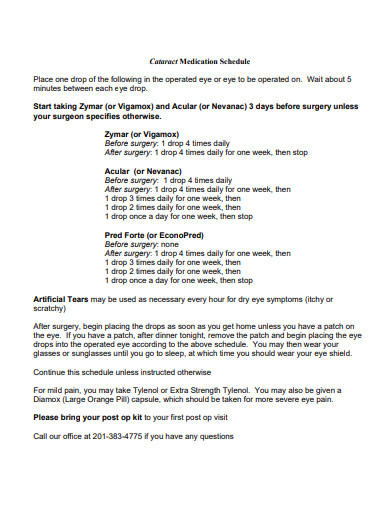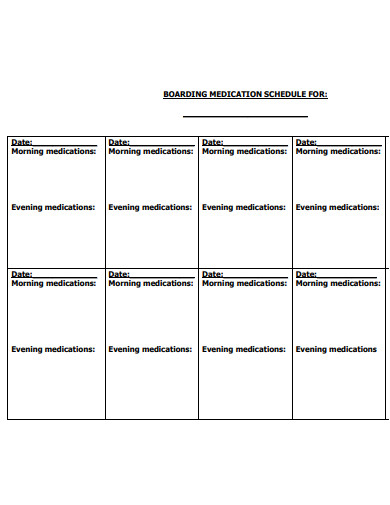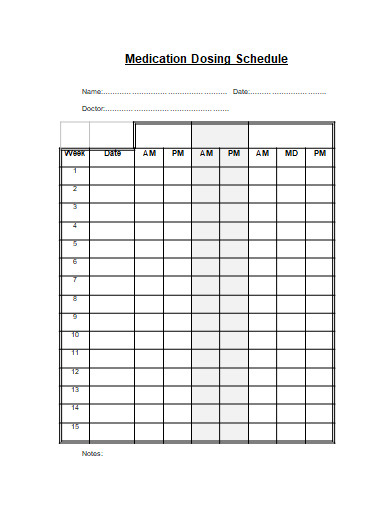If your doctor requires you to take meds or medication, this may be due to an underlying illness, or perhaps you have undergone surgery. Usually, doctors would jot down what type and the name of the medicines you should take, the dosage, how many times a day, and for how long. In order to remember all these, it is important that you create a medication schedule to keep track of your doctor’s instructions. You do not want to risk complications since taking the wrong meds can be risky and may endanger your life in the process. With a medication schedule, you’ve got something to remind you until you the end of the session. To learn more about this, let us discuss this further below. And if you need to start preparing this document, check out our free medication schedule samples that are available for download on this page.
10+ Medication Schedule Samples
1. Medication Schedule
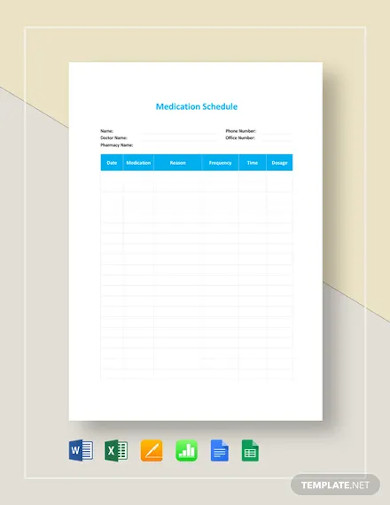
2. Special Education Schedule
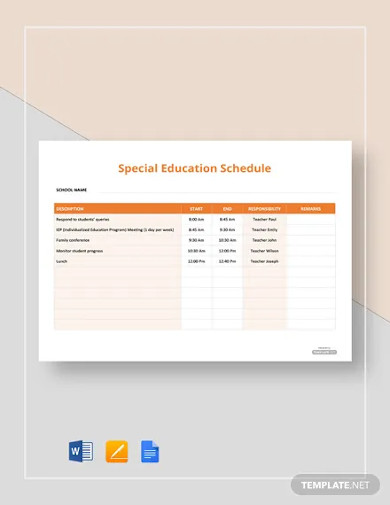
3. Monthly Medication Schedule
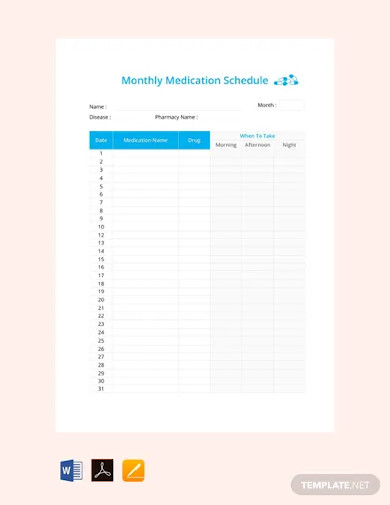
4. Patient Medication Schedule
5. Cardiac Medication Schedule
6. Prescription Medication Schedule
7. Daily Medication Schedule
8. Pre-Medication Schedule for Injection
9. Cataract Medication Schedule
10. Boarding Medication Schedule
11. Medication Dosing Schedule
What Is a Medication Schedule?
Creating a schedule is a way to remind us of the list of activities or tasks to be done over a specific period. You can opt to create a daily, weekly, or monthly schedule. Some may want to prepare an advance schedule for several months onwards, but the problem with doing such is that anything can happen in between. So it’s rather feasible to prepare short-term schedules since they are most likely within your control. When it comes to taking medication, it is rather important to prepare your own schedule especially if you need to take more than one medicine. You do not want to end up confusing yourself or taking the wrong one at the wrong time. We tend to forget about certain things, but with a schedule, in place, you are able to keep track of your medicine intake.
How To Create a Medication Schedule
If you notice that it becomes harder for you to track your prescriptions, then it’s high time to start scheduling. Aside from tracking your intake, a schedule can become a source of reference for you or a doctor in case there are any side effects that can compromise your health. So, to help you work on that medication schedule we’ve got some helpful tips below.
I. Doctor’s Instructions
Before you can get down to organizing your medication schedule, the first thing you need to do is to go over your doctor’s instructions. While you are at the clinic or hospital make sure you understand everything the doctor has said and written down. If communication isn’t your doctor’s strong point, ask questions until you’re satisfied.
II. Create a Medication Schedule
There are several ways to create your own medication schedule, you can start by downloading our templates so you can just fill up all the necessary details or you can personalize one. Start by creating a chart where you can include the following information below.
- Create a medication chart where you can properly organize each detail of your medication.
- For each row and column, write down the details such as the medicine name, the number of dosages to be taken, at what time should it be taken, and the date or day of the week.
- If you want to be more specific as possible you can include the brand name and what the medicine is for.
- You can also add an area where you can add some comments as a reminder to refer to your doctor if you are having side effects.
III. Pill Reminder
Even though with a medication schedule in place, sometimes anyone tends to forget when to take the pills. So one great way to get you reminded is to download an electronic pill reminder where an alarm would sound off in your gadget as a reminder alerting you to what medication needs to be taken and how much.
IV. Keep Track of the Prescription Labels
As you strive to follow your medication schedule, one important thing you need to also do is to regularly check the prescription labels if none are expired or if you still have enough left.
FAQs
What Is Medication Management?
This is the process of overseeing and organizing prescribed medications for patients to ensure they are taken properly and achieve their planned, therapeutic outcome.
What is a Prescription?
This is a medical drug that is ordered by a doctor or medical practitioner to serve as a remedy for their patients.
Why is it Important to follow the Doctor’s Prescription?
If you want to live a longer and healthier life then it is important that you are able to follow all your doctor’s instructions regarding prescription meds.
Doctors are medical professionals who know what’s best for us. If we want to live a healthier and longer life then following their instruction is crucial. To help you remember what they have given and keep you up to date, start creating a medication schedule now.
Related Posts
FREE 10+ Employees Schedule Samples in PDF
FREE 10+ On Call Schedule Samples in PDF
FREE 10+ Time Block Schedule Samples in PDF
FREE 10+ Gym Schedule Samples in PDF | MS Word | Apple Pages | Google Docs | Keynote |
FREE 10+ Daily Hourly Schedule Samples in PDF
FREE 10+ Weekly Schedule Template with Hours Samples in PDF
FREE 10+ 7 Day Weekly Schedule Samples in PDF
FREE 10+ Working Schedule Template Samples in PDF
FREE 6+ Preschool Schedule Template Samples in PDF
FREE 10+ Daily School Schedule Samples in PDF | MS Word | Google Docs | Google Sheets | Excel
FREE 10+ Day Schedule Samples in PDF
FREE 10+ Daily Work Schedule Samples in PDF
FREE 10+ 24 Hours Schedule Samples in PDF | Word | Google Docs | Google Sheets | Excel | Apple Numbers | Apple Pages
FREE 10+ Baseball Schedule Samples in PDF
FREE 10+ Availability Schedule Samples in PDF

